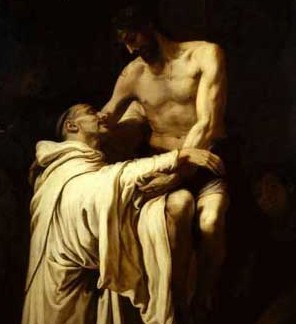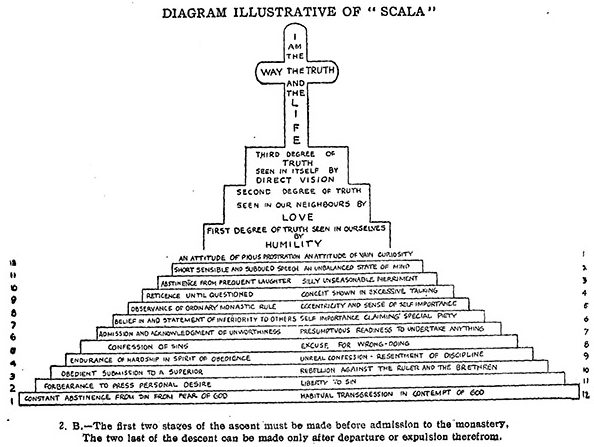Podcast: Play in new window | Download (Duration: 30:07 — 20.7MB) | Embed
Subscribe: Apple Podcasts | Spotify | Amazon Music | Android | Pandora | iHeartRadio | JioSaavn | Podchaser | Gaana | Podcast Index | Email | TuneIn | Deezer | Anghami | RSS | More

St. Bernard and the 12 Steps to Humility and Pride – Beginning to Pray with Dr. Anthony Lilles
Dr. Anthony Lilles and Kris McGregor have a discussion about St. Bernard of Clairvaux. They begin by discussing St. Bernard’s deep devotion to the Virgin Mary and his belief that Mary serves as the “neck” of the Mystical Body of Christ, through whom all grace from Christ is mediated to humanity.
Dr. Lilles outlines the historical context in which St. Bernard lived (1090-1153), highlighting his role in the Crusades, monastic reform, and his influence on other saints and mystics. Bernard’s central mission was to promote ongoing conversion to Christ, seeing it as the path to renewing the Church.
They go into St. Bernard’s teachings on humility and pride, as found in his writings. Dr. Lilles explains that for Bernard, truth is not just factual or feasible but relational and rooted in a deeper reality—a truth that is discovered through contemplation and faith. He contrasts this with modern views of truth, which often focus on what is feasible or factual, leading to a superficial understanding of reality.

Discerning Hearts Reflection Questions
- Understanding Marian Devotion: How does St. Bernard of Clairvaux’s view of Mary as the “neck of the mystical body” deepen your understanding of Marian devotion and its role in leading us closer to Christ?
- Personal Conversion: In what areas of your life do you feel called to deeper conversion, following St. Bernard’s emphasis on ongoing transformation to strengthen the Church?
- Contemplation of Truth: Reflect on how you perceive truth—do you view it primarily as facts and feasibility, or are you open to the deeper, saving truth that St. Bernard speaks of, which comes through faith and contemplation?
- Facing Pain with Humility: How can embracing humility and recognizing your own sinfulness help you to confront personal pain and suffering without transferring it onto others, as discussed in the context of marriage and family?
- Pursuit of Salvation: How does acknowledging your need for salvation as a sinner change the way you approach your relationship with God and others, and how might it influence your journey toward spiritual growth?
 THE TWELVE DEGREES OF HUMILITY
THE TWELVE DEGREES OF HUMILITY
XII. A permanent attitude of bodily; and spiritual prostration.
XI. The speech of a monk should be short, sensible and in a subdued tone.
X. Abstinence from frequent and light laughter.
IX. Reticence, until asked for his opinion.
VIII. Observance of the general rule of the monastery.
VII. Belief in and declaration of one’s inferiority to others.
VI. Admission and acknowledgment of one’s own unworthiness and uselessness.
V. Confession of sins.
IV. Patient endurance of hardship and severity in a spirit of obedience.
III. Obedient submission to superiors.
II. Forbearance to press personal desire.
I. Constant abstinence from sin for fear of God.
THE TWELVE DEGREES OF PRIDE TAKEN DOWNWARDS
I. Curiosity, when a man allows His sight and other senses to stray after things which do not concern him.
II. An unbalanced state of mind, showing itself in talk unseasonably joyous and sad.
III. Silly merriment exhibited in too frequent laughter.
IV. Conceit expressed in much talking.
V. Eccentricity attaching exaggerated importance to one’s own conduct.
VI. Self-assertion holding oneself to be more pious than others.
VII. Presumption readiness to undertake anything.
VIII. Defense of wrong-doing.
IX. Unreal confession detected when severe penance is imposed.
X. Rebellion against the rules and the brethren.
XI. Liberty to sin.
XII. Habitual transgression.
For other episodes in the series visit the Discerning Hearts page for Dr. Anthony Lilles
Anthony Lilles, S.T.D., has served the Church and assisted in the formation of clergy and seminarians since 1994. Before coming to St. Patrick’s, he served at seminaries and houses of formation in the Archdiocese of Denver and the Archdiocese of Los Angeles. The son of a California farmer, married with young adult children, holds a B.A. in theology from the Franciscan University of Steubenville with both the ecclesiastical licentiate and doctorate in spiritual theology from the Pontifical University of Saint Thomas Aquinas in Rome (the Angelicum). An expert in the writings of St. Elizabeth of the Trinity and the Carmelite Doctors of the Church, he co-founded the Avila Institute for Spiritual Formation and the High Calling Program for priestly vocations. He also founded the John Paul II Center for Contemplative Culture, which hosts symposiums, retreats, and conferences. In addition to his publications, he blogs at www.beginningtopray.com .






